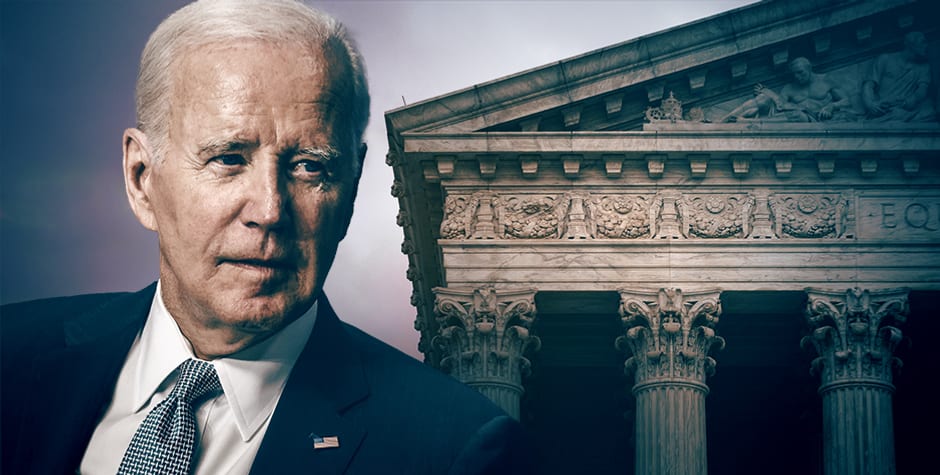ACLJ Files Amicus Brief at the Supreme Court To Stop Biden’s Excessive Prosecution and Protect the Right To Protest
For years, the ACLJ has represented pro-life Americans and sought to protect their right to protest and engage in pro-life advocacy. ACLJ Chief Counsel Jay Sekulow has often argued on behalf of pro-life protestors; for example, in Bray v. Alexandria Women’s Health Clinic, he helped defend pro-life protestors from charges of “conspiracy.” We just filed a major amicus brief defending the rights of the people to protest from a new avenue of attack.
In a devastating blow to the fundamental principles of free speech enshrined in the First Amendment, the D.C. Circuit has wielded a destruction-of-evidence statute as a weapon against any actions that might “influence” official proceedings. We have filed an amicus brief at the U.S. Supreme Court in Fischer v. United States to defend people’s right to protest and advocate. Our brief is not in support of the particular party in that case, nor does it concern the specific facts alleged against Joseph Fischer. Rather, our brief is filed on behalf of anyone who may engage in constitutionally protected advocacy, especially advocacy seeking to protect the right to life.
The statute in question is 18 U.S.C. § 1512, part of a set of statutes relating to the destruction of evidence. It provides a 20-year prison sentence for
[w]hoever corruptly — (1) alters, destroys, mutilates, or conceals a record, document, or other object, or attempts to do so, with the intent to impair the object’s integrity or availability for use in an official proceeding; or (2) otherwise obstructs, influences, or impedes any official proceeding, or attempts to do so.
18 U.S.C. § 1512(c). This law was written as part of the Corporate Fraud Accountability Act.
The case concerns a prosecution arising out of the events of January 6, 2021. The charge brought against Fischer has also been brought against many other individuals who were there that day, as well as against President Trump himself. The trial judge here originally determined that the statute did not apply to the events of January 6, but the D.C. Circuit reversed that decision. The Supreme Court is now reviewing the D.C. Circuit’s interpretation to determine whether it is an appropriate interpretation. This case goes far beyond the radical Left’s attempt to throw the book at President Trump through the use of novel legal theories and could significantly curtail lawful protests and First Amendment activity. But it should be noted that a loss for the prosecution in this case would significantly impact President Trump’s cases.
The criminal activity for which people are being charged is to “otherwise . . . influence[] . . . any official proceeding.” The D.C. Circuit decided that “otherwise” does not really limit the statute and that any action taken to influence official actions is sufficient to be a violation of this law. It did so, even conceding that “outside of the January 6 cases brought in this jurisdiction, there is no precedent for using § 1512(c)(2) to prosecute the type of conduct at issue in this case.” United States v. Fischer, 64 F.4th 329, 339 (D.C. Cir. 2023) (emphasis added). But the court’s holding does not apply only to the events of January 6. In the court’s view, this statute includes any act that influences, affects, or hinders the proceeding, including advocacy, lobbying, and protest. We highlighted in our brief how this interpretation would sweep many areas of First Amendment activity into this statute with a 20-year prison sentence. Any protest outside a courthouse or outside a legislative proceeding tries to influence it; by the court’s interpretation, any such activity can be criminal. (Think of everything from the extreme Sen. Schumer’s “you will reap the whirlwind” on the steps of the U.S. Supreme Court to any benign public statement for or against a particular judge’s ruling, likely even this blog post.) For the people constantly trying to make their voices heard through advocacy, this interpretation stifles speech seeking to influence official actions.
The only limitation of this statute is that the action taken must be taken “corruptly.” But as we emphasized in our brief, “corruptly” can mean almost anything and is something a jury would have to decide. At best, the government may go after whomever it chooses and leave it to defendants to address their own mental state at trial. Even where such defendants could prevail on appeal, lives and careers are ruined and speech is chilled. The financial and reputational costs of a defense would itself be a severe punishment. It is unconscionable that a law would be interpreted so broadly as to apply to anyone, depending on their mental state or intent.
We pointed out that the solution is simple: Rather than endorsing the D.C. Circuit’s extension of this statute to protected activity, the Supreme Court should simply recognize that “otherwise” properly defines the role of the statute to apply to the destruction of evidence. If the statute is properly interpreted, constitutional overreach will be avoided. That interpretation is also how the Supreme Court has interpreted “otherwise” in the past.
The fundamental problem with this case is the “broader legal implications of the Government’s boundless interpretation.” McDonnell v. United States, 579 U.S. 550, 581 (2016). As the ACLJ argued in its amicus brief in McDonnell, criminal laws must not be applied in such a way that they are used to target the First Amendment rights of citizens. The Corporate Fraud Accountability Act should not be twisted into a tool to attack individuals for exercising their rights.
